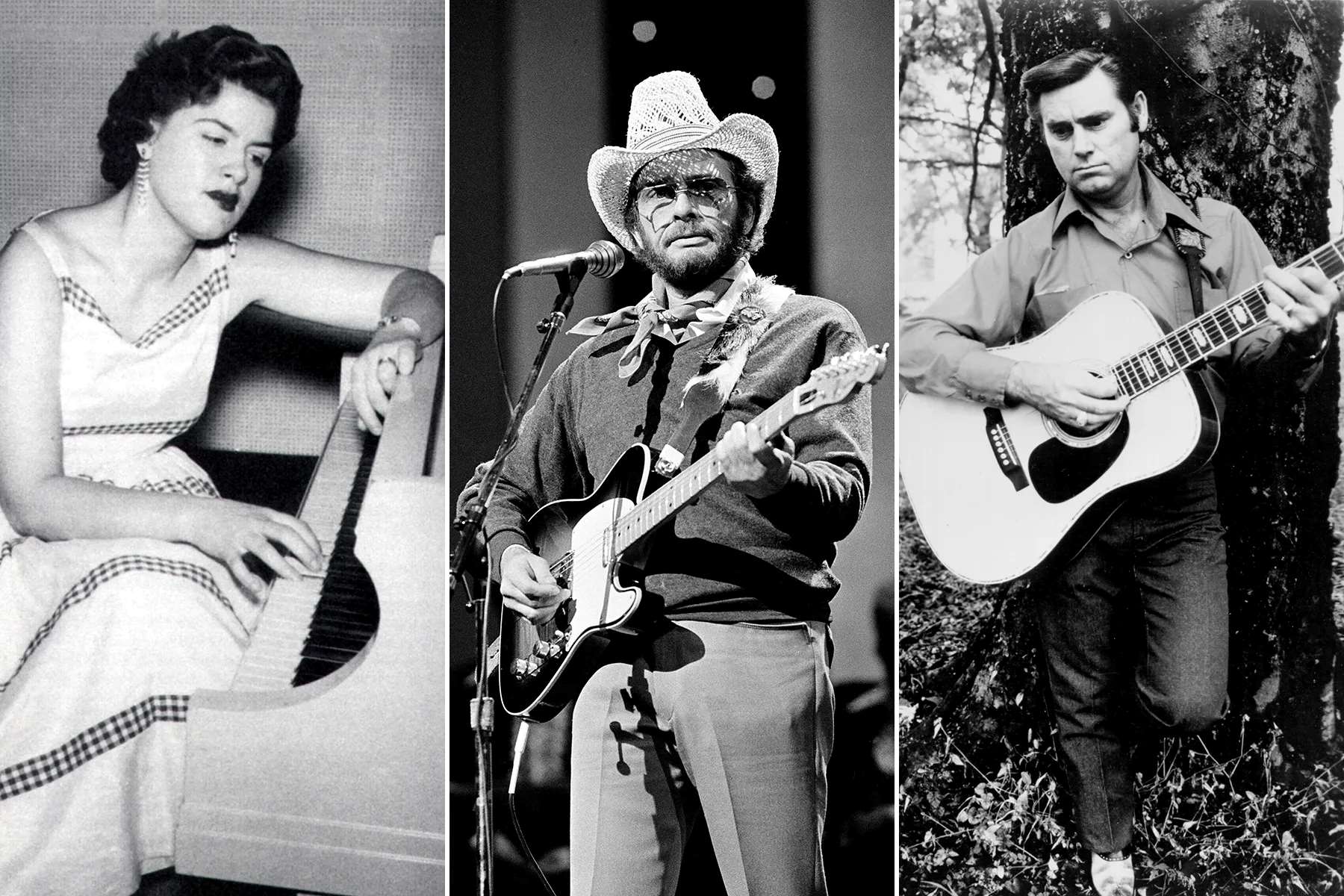Home>History>Famous Cuban Immigrants Who Left Their Home Country For America


History
Famous Cuban Immigrants Who Left Their Home Country For America
Published: January 7, 2024
Explore the remarkable history of famous Cuban immigrants who made a lasting impact after leaving their homeland for America. Discover their inspiring stories of resilience and success.
(Many of the links in this article redirect to a specific reviewed product. Your purchase of these products through affiliate links helps to generate commission for Regretless.com, at no extra cost. Learn more)
Table of Contents
Introduction
Cuba, a country rich in culture and history, has produced a myriad of talented individuals who have made significant contributions to various fields. Among these remarkable individuals are Cuban immigrants who left their homeland in pursuit of new opportunities and made a profound impact in the United States. Their journeys are emblematic of resilience, determination, and the pursuit of the American dream.
These individuals have not only excelled in their respective fields but have also played a pivotal role in shaping the cultural landscape of America. From the realms of music and entertainment to sports and activism, these immigrants have left an indelible mark on the fabric of American society. Their stories serve as a testament to the enduring spirit of immigrants and the invaluable contributions they make to their adopted homeland.
As we delve into the lives of these influential figures, we gain insight into the challenges they faced, the triumphs they achieved, and the enduring legacy they have left behind. Their narratives are a testament to the power of perseverance, the pursuit of excellence, and the enduring impact of immigrants on the tapestry of American history and culture.
Desi Arnaz
Desi Arnaz, a trailblazing Cuban immigrant, left an indelible mark on American entertainment and culture. Born Desiderio Alberto Arnaz y de Acha III on March 2, 1917, in Santiago de Cuba, he embarked on a journey that would solidify his legacy as a pioneering figure in the realm of television and music.
Arnaz's impact on American culture is perhaps most notably exemplified through his role as Ricky Ricardo on the iconic television series "I Love Lucy." Not only did he portray the character with charisma and charm, but he also introduced Cuban music and dance to a wide American audience. His band, the Desi Arnaz Orchestra, showcased the rhythms of conga and mambo, captivating viewers and leaving an indelible imprint on the American musical landscape.
Beyond his on-screen accomplishments, Arnaz made significant contributions behind the scenes. He co-founded Desilu Productions, a pioneering television production company that not only produced "I Love Lucy" but also revolutionized the television industry. Arnaz's innovative approach to television production, including the implementation of the three-camera technique and the use of live audiences, set new standards for the medium and cemented his status as a visionary in the entertainment industry.
Arnaz's journey from Cuba to the United States epitomizes the immigrant experience, characterized by resilience, determination, and an unwavering pursuit of success. His impact transcends entertainment, serving as a testament to the cultural exchange between Cuba and the United States. Through his enduring legacy, Desi Arnaz remains an iconic figure whose influence continues to resonate in the realms of television, music, and cultural exchange, exemplifying the profound impact of Cuban immigrants on American society.
Gloria Estefan
Gloria Estefan, a Cuban-born immigrant, has left an indelible mark on the music industry and has become a symbol of resilience and cultural influence. Born Gloria María Milagrosa Fajardo García on September 1, 1957, in Havana, Cuba, her journey from her native country to the United States is a testament to the transformative power of perseverance and the pursuit of one's passion.
Estefan's musical prowess and captivating stage presence have propelled her to international acclaim. As the lead vocalist of the Miami Sound Machine, she brought a fusion of pop, Latin, and world music to the forefront of the industry, captivating audiences with infectious rhythms and heartfelt lyrics. Her chart-topping hits, including "Conga," "Rhythm Is Gonna Get You," and "Anything for You," not only dominated the airwaves but also transcended cultural boundaries, earning her a dedicated global fan base.
Beyond her musical accomplishments, Estefan's journey is characterized by resilience in the face of adversity. A near-fatal bus accident in 1990 left her with severe injuries, including a fractured spine, which posed a significant threat to her career. However, her remarkable recovery and triumphant return to the stage served as a source of inspiration for countless individuals facing their own challenges, solidifying her status as a symbol of resilience and perseverance.
Estefan's cultural impact extends beyond her musical contributions. As a Cuban immigrant, she has been an advocate for cultural exchange and understanding, using her platform to celebrate her heritage and promote unity through music. Her ability to seamlessly blend Latin influences with mainstream pop music has not only enriched the musical landscape but has also fostered a deeper appreciation for cultural diversity.
In recognition of her contributions, Estefan has received numerous accolades, including multiple Grammy Awards and a Kennedy Center Honor. Moreover, her philanthropic efforts and advocacy for various causes, including LGBTQ+ rights and humanitarian initiatives, underscore her commitment to using her influence for positive change.
Gloria Estefan's journey from Cuba to the United States is a testament to the enduring impact of immigrants on the cultural tapestry of America. Her resilience, musical prowess, and advocacy for unity have solidified her legacy as a trailblazing figure in the music industry, inspiring generations and exemplifying the profound influence of Cuban immigrants on American society.
Andy Garcia
Andy Garcia, a Cuban-born actor, director, and producer, has carved a distinguished career in the entertainment industry, leaving an indelible mark on American cinema. Born Andrés Arturo García Menéndez on April 12, 1956, in Havana, Cuba, his journey from his homeland to the United States is a testament to the enduring spirit of immigrants and the pursuit of artistic excellence.
Garcia's cinematic endeavors have garnered critical acclaim and have solidified his status as a versatile and compelling performer. His breakout role in "The Untouchables" (1987) catapulted him into the spotlight, showcasing his magnetic on-screen presence and acting prowess. Subsequent performances in films such as "The Godfather Part III" (1990), "When a Man Loves a Woman" (1994), and "Ocean's Eleven" (2001) further underscored his ability to inhabit diverse characters with depth and authenticity.
Beyond his acting accolades, Garcia's foray into filmmaking as a director and producer has showcased his multifaceted talents. His directorial debut, "The Lost City" (2005), a poignant portrayal of the Cuban Revolution, not only demonstrated his storytelling acumen but also reflected his personal connection to the historical and cultural narrative of his homeland.
Garcia's journey as a Cuban immigrant has imbued his work with a profound sense of cultural resonance, infusing his performances with authenticity and emotional depth. His commitment to portraying rich, nuanced characters and exploring narratives that reflect the immigrant experience has resonated with audiences, transcending cultural boundaries and fostering a deeper understanding of the immigrant journey.
As an advocate for cultural exchange and artistic expression, Garcia's contributions extend beyond the silver screen. His dedication to preserving and celebrating Cuban heritage, coupled with his support for emerging talent within the Latinx community, exemplifies his commitment to fostering diversity and representation within the entertainment industry.
Garcia's enduring impact as a Cuban immigrant in the American film industry serves as a testament to the transformative power of storytelling and the universal resonance of the immigrant experience. His cinematic legacy, characterized by compelling performances and a dedication to authentic storytelling, underscores the invaluable contributions of Cuban immigrants to the cultural tapestry of America.
Celia Cruz
Celia Cruz, an iconic Cuban singer known as the "Queen of Salsa," left an indelible mark on the music industry and became a symbol of resilience, passion, and cultural influence. Born Úrsula Hilaria Celia de la Caridad Cruz Alfonso on October 21, 1925, in Havana, Cuba, her journey from her native country to the United States is a testament to the transformative power of music and the enduring impact of the immigrant experience.
Cruz's musical career spanned over five decades, during which she captivated audiences with her electrifying performances and unparalleled vocal talent. Her powerful and soulful voice, combined with her vibrant stage presence, propelled her to international acclaim, earning her the title of the "Queen of Salsa." With hits such as "La Vida Es Un Carnaval," "Quimbara," and "Bemba Colora," Cruz not only dominated the salsa music scene but also transcended cultural boundaries, garnering a devoted global following.
Beyond her musical prowess, Cruz's journey is characterized by resilience in the face of adversity. Fleeing the political upheaval in Cuba, she sought refuge in the United States, where she continued to pursue her passion for music with unwavering determination. Her ability to infuse joy and passion into her performances resonated with audiences worldwide, solidifying her status as a cultural icon and a beacon of hope for the Cuban diaspora.
Cruz's cultural impact extends beyond her musical contributions. As a Cuban immigrant, she served as a cultural ambassador, using her platform to celebrate her heritage and promote unity through music. Her collaborations with renowned artists from diverse backgrounds further exemplified her commitment to fostering cultural exchange and understanding through the universal language of music.
In recognition of her contributions, Cruz received numerous accolades, including multiple Grammy Awards and a posthumous Lifetime Achievement Award. Moreover, her philanthropic efforts and advocacy for various causes, including education and the arts, underscored her commitment to using her influence for positive change and uplifting the Latinx community.
Celia Cruz's journey from Cuba to the United States is a testament to the enduring impact of immigrants on the cultural tapestry of America. Her resilience, musical prowess, and advocacy for unity have solidified her legacy as a trailblazing figure in the music industry, inspiring generations and exemplifying the profound influence of Cuban immigrants on American society.
Read more: Buying A Country: Is It Really Possible?
Jose Canseco
Jose Canseco, a Cuban-born former Major League Baseball (MLB) player, emerged as a prominent figure in the sports world, leaving a lasting impact on the game of baseball and igniting discussions on athleticism, performance, and the pursuit of excellence. Born on July 2, 1964, in Havana, Cuba, Canseco's journey from his homeland to the United States epitomizes the pursuit of the American dream and the transformative power of athletic prowess.
Canseco's athletic prowess and powerful presence on the field propelled him to stardom within the MLB. His remarkable career as an outfielder and designated hitter spanned nearly two decades, during which he garnered accolades and recognition for his exceptional performance. Notably, his tenure with the Oakland Athletics and the Texas Rangers showcased his extraordinary hitting abilities and field presence, earning him multiple All-Star selections and the prestigious American League Most Valuable Player (MVP) award in 1988.
Beyond his on-field accomplishments, Canseco's impact reverberated throughout the sports world due to his influential book, "Juiced: Wild Times, Rampant 'Roids, Smash Hits & How Baseball Got Big." In this controversial exposé, Canseco candidly addressed the prevalence of performance-enhancing substances in professional baseball, sparking widespread discussions and investigations into the use of steroids and their impact on the integrity of the sport.
Canseco's willingness to address sensitive topics within the realm of professional sports not only shed light on the complexities of athletic competition but also prompted a reevaluation of the ethical and moral considerations surrounding performance enhancement. His bold stance and unapologetic approach to addressing these issues positioned him as a polarizing figure, sparking debates on the intersection of sports, ethics, and the pursuit of excellence.
While his career faced scrutiny and challenges, Canseco's enduring influence on the sports world transcends controversies, serving as a catalyst for introspection and reform within professional athletics. His journey from Cuba to the United States, coupled with his impact on the game of baseball and the broader sports landscape, exemplifies the profound contributions of Cuban immigrants to the cultural tapestry of America.
Jose Canseco's legacy as a trailblazing athlete, author, and influential figure in the sports world underscores the transformative power of athletic prowess and the enduring impact of immigrants on the realm of professional sports. His story serves as a testament to the resilience, determination, and indelible influence of Cuban immigrants on the fabric of American society.
Emilio Estefan
Emilio Estefan, a Cuban-born music producer, entrepreneur, and visionary, has significantly shaped the landscape of the music industry and cultural exchange between Cuba and the United States. Born on March 4, 1953, in Santiago de Cuba, Estefan's journey from his native country to the United States exemplifies the enduring spirit of immigrants and the transformative power of artistic innovation.
Estefan's impact on the music industry is profound, characterized by his ability to blend diverse musical influences and propel Latin music to the forefront of the global stage. As a founding member of the Miami Sound Machine and the husband of the iconic Gloria Estefan, he played a pivotal role in shaping the "Miami Sound," a fusion of Latin, pop, and world music that captivated audiences worldwide. His production acumen and keen artistic sensibilities have resulted in chart-topping hits and critically acclaimed albums, solidifying his reputation as a trailblazing music producer.
Beyond his contributions to the realm of music, Estefan's entrepreneurial endeavors have further underscored his impact on cultural exchange and business innovation. As the founder of Estefan Enterprises, he has nurtured emerging talent, produced award-winning films and theatrical productions, and championed initiatives that celebrate Latinx culture. His commitment to fostering diversity and representation within the entertainment industry has not only enriched the artistic landscape but has also empowered aspiring artists to share their voices and stories with the world.
Moreover, Estefan's philanthropic efforts and advocacy for various causes, including education and cultural preservation, reflect his dedication to using his influence for positive change. His support for initiatives that uplift the Latinx community and promote cross-cultural understanding has positioned him as a leading figure in the realm of philanthropy and social impact.
Emilio Estefan's journey from Cuba to the United States serves as a testament to the enduring influence of immigrants on the cultural tapestry of America. His innovative spirit, artistic vision, and commitment to fostering cultural exchange have left an indelible mark on the music industry and beyond, exemplifying the profound contributions of Cuban immigrants to the fabric of American society.
Maria Conchita Alonso
Maria Conchita Alonso, a Cuban-born actress, singer, and philanthropist, has made significant contributions to the entertainment industry and has become a symbol of resilience, cultural influence, and humanitarian advocacy. Born on June 29, 1957, in Cienfuegos, Cuba, Alonso's journey from her homeland to the United States exemplifies the pursuit of artistic excellence and the transformative power of using one's platform for positive change.
Alonso's multifaceted career spans across film, television, and music, showcasing her versatility and captivating presence on the global stage. Her breakout role in the film "Moscow on the Hudson" (1984) propelled her to international acclaim, establishing her as a talented and compelling actress. Subsequent performances in films such as "The Running Man" (1987) and "Predator 2" (1990) further solidified her status as a prominent figure in the world of cinema, earning her accolades and recognition for her exceptional talent.
In addition to her acting prowess, Alonso's musical endeavors have garnered widespread acclaim, with her albums showcasing a fusion of Latin, pop, and world music influences. Her chart-topping hits, including "Acércate" and "O Ella O Yo," not only showcased her vocal prowess but also resonated with audiences worldwide, earning her a dedicated global fan base.
Beyond her artistic accomplishments, Alonso has been a steadfast advocate for humanitarian causes, using her platform to raise awareness and support initiatives that address pressing social issues. Her unwavering commitment to philanthropy and advocacy for animal rights, environmental conservation, and humanitarian aid reflects her dedication to using her influence for positive change, transcending the realms of entertainment and making a tangible impact on society.
Alonso's journey from Cuba to the United States serves as a testament to the enduring influence of immigrants on the cultural tapestry of America. Her artistic versatility, philanthropic endeavors, and advocacy for social causes exemplify the profound contributions of Cuban immigrants to the fabric of American society. Through her enduring legacy, Maria Conchita Alonso remains a trailblazing figure in the entertainment industry, inspiring generations and exemplifying the transformative power of using one's platform for positive change.
Ninoska Perez Castellon
Ninoska Perez Castellon, a prominent Cuban-American journalist and influential voice in the realm of media and advocacy, has played a pivotal role in shaping public discourse, fostering cultural understanding, and championing the cause of freedom and democracy. Born in Havana, Cuba, Perez Castellon's journey from her native country to the United States embodies the resilience, determination, and unwavering commitment to amplifying the voices of the oppressed.
As a journalist and radio host, Perez Castellon has fearlessly confronted pressing issues, utilizing her platform to shed light on the realities faced by individuals living under oppressive regimes. Her incisive commentary and unwavering dedication to truth-telling have positioned her as a leading figure in the fight for human rights and freedom of expression. Through her radio program, "La Ventana," she has provided a vital platform for dialogue, empowering individuals to share their stories and advocate for positive change.
Perez Castellon's advocacy extends beyond the airwaves, as she has been a vocal proponent for the Cuban people and a staunch critic of the oppressive regime in Cuba. Her unwavering commitment to amplifying the voices of dissidents, advocating for political prisoners, and championing the cause of democracy has resonated with audiences worldwide, earning her widespread respect and admiration.
Moreover, Perez Castellon's efforts have transcended the realm of journalism, as she has been actively involved in initiatives that promote cultural exchange, preserve Cuban heritage, and advocate for the rights of the Cuban people. Her dedication to fostering understanding and solidarity within the Cuban diaspora reflects her deep-rooted commitment to unity and empowerment.
In recognition of her contributions, Perez Castellon has received accolades and honors, underscoring her impact as a leading advocate for human rights and democratic principles. Her unwavering dedication to amplifying marginalized voices, advocating for freedom, and fostering cross-cultural understanding exemplifies the enduring influence of Cuban immigrants on the fabric of American society.
Through her tireless efforts, Ninoska Perez Castellon has solidified her legacy as a trailblazing figure in the realm of journalism and advocacy, inspiring individuals to stand up for their beliefs and champion the cause of freedom. Her journey from Cuba to the United States serves as a testament to the transformative power of using one's voice for positive change and the enduring impact of immigrants on the cultural tapestry of America.
Daisy Fuentes
Daisy Fuentes, a Cuban-American television host, model, and entrepreneur, has left an indelible mark on the entertainment industry and has become a symbol of cultural influence, business acumen, and philanthropic dedication. Born on November 17, 1966, in Havana, Cuba, Fuentes' journey from her native country to the United States is emblematic of the pursuit of excellence and the transformative power of seizing opportunities in the face of adversity.
Fuentes' multifaceted career spans across television, fashion, and entrepreneurship, showcasing her versatility and impact on the global stage. Her groundbreaking role as the first Latina VJ on MTV catapulted her to prominence, solidifying her status as a trailblazing figure in the realm of entertainment. As a pioneering television host, she not only captivated audiences with her charisma and wit but also shattered barriers, paving the way for greater diversity and representation within the media landscape.
Moreover, Fuentes' influence extended beyond her television career, as she made significant strides in the fashion industry. Her entrepreneurial endeavors led to the launch of successful fashion and beauty lines, showcasing her keen eye for style and her commitment to empowering individuals to look and feel their best. By leveraging her platform to celebrate diversity and inclusivity, she has inspired countless individuals to embrace their unique identities and express themselves with confidence.
In addition to her contributions to the realms of entertainment and fashion, Fuentes has been a dedicated advocate for various philanthropic causes, including animal welfare and humanitarian initiatives. Her unwavering commitment to using her influence for positive change has resonated with audiences worldwide, underscoring her dedication to making a tangible impact on society beyond the realm of entertainment.
Fuentes' journey from Cuba to the United States serves as a testament to the enduring influence of immigrants on the cultural tapestry of America. Her resilience, business acumen, and commitment to philanthropy exemplify the profound contributions of Cuban immigrants to the fabric of American society. Through her enduring legacy, Daisy Fuentes remains a trailblazing figure in the entertainment industry, inspiring generations and exemplifying the transformative power of seizing opportunities and using one's platform for positive change.
Conclusion
The stories of these influential Cuban immigrants who left their homeland for the United States resonate with resilience, determination, and unwavering pursuit of excellence. From the realms of entertainment and music to sports, journalism, and advocacy, their journeys exemplify the transformative power of the immigrant experience and the enduring impact of Cuban immigrants on the cultural tapestry of America.
Through their remarkable achievements, these individuals have not only enriched the artistic and professional landscapes but have also served as cultural ambassadors, fostering unity and understanding between Cuba and the United States. Their contributions have transcended borders, resonating with audiences worldwide and inspiring generations to embrace diversity, pursue their passions, and advocate for positive change.
As trailblazers in their respective fields, these Cuban immigrants have shattered barriers, challenged norms, and redefined the narrative of success. Their stories serve as a testament to the profound influence of immigrants on American society, underscoring the invaluable contributions that individuals from diverse backgrounds bring to the fabric of the nation.
Moreover, the enduring legacies of these influential figures continue to inspire and empower individuals, transcending cultural boundaries and fostering a deeper appreciation for the rich tapestry of immigrant experiences. Their journeys from Cuba to the United States embody the transformative power of perseverance, talent, and the unwavering pursuit of the American dream.
In celebrating the achievements of these remarkable individuals, we honor the indelible mark they have left on the realms of entertainment, music, sports, journalism, and advocacy. Their stories serve as a reminder of the enduring spirit of immigrants and the immeasurable contributions they make to their adopted homeland.
As we reflect on the journeys of these influential Cuban immigrants, we recognize the profound impact of their resilience, talent, and unwavering commitment to using their platforms for positive change. Their stories exemplify the enduring influence of immigrants on the cultural tapestry of America, inspiring future generations to embrace diversity, pursue their passions, and champion the cause of unity and understanding.
In essence, the narratives of these influential Cuban immigrants stand as a testament to the transformative power of the immigrant experience, the enduring legacy of cultural exchange, and the invaluable contributions that immigrants make to the fabric of American society.













